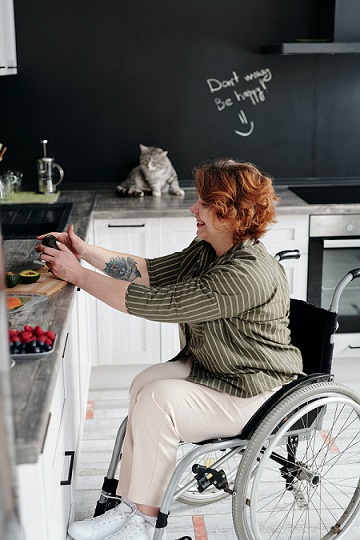
Tens of millions of U.S. residents have a problem. There aren’t enough homes for the elderly and disabled population. One in four of us — more than 60 million people — have a disability. And our older adult population is rapidly growing.
As a general matter, the United States needs something between 3 million and 6 million homes, according to Republican Senator Mike Braun of Indiana, who sits on the Senate’s aging committee. Bob Casey, the U.S. Senator and former governor of Pennsylvania, notes how disabled home seekers are doubly disadvantaged in this market. They need homes they can afford and homes they can navigate safely, despite their disabilities.
Casey, who chairs the Senate Special Committee on Aging, recently proposed a federal bill. It would require the Low-Income Housing Tax Credit Program to fund homes with accessibility features.
Will Casey’s proposal get support? Will other laws be proposed? We’ll have to see. We’re certainly expecting a heightened interest in this issue nationwide.
“Warehoused” Disabled Residents Sue Massachusetts
Accessible homes — homes with, say, wide doorways, low counters, and safe, fall-proof bathrooms — can help older and disabled people stay home as they age.
Less than 5% of the homes in the country are outfitted with accessibility features. Less than 1% of homes come complete with wheelchair ramps and reachable cabinets and sinks.
When people with disabilities can’t afford (or navigate) homes, they may wind up housed in nursing homes and unable to break out without assistance. It’s happening in Massachusetts. Good luck finding affordable homes there, let alone ground-floor level homes or homes in buildings with elevators and in-home assistance.
In 2022, a group of unwilling nursing home residents got representation from Greater Boston Legal Services and others. And they have filed a federal class action lawsuit in a Boston court. A win for the plaintiffs in court could compel the Massachusetts Office of Health and Human Services to help thousands of people find housing and in-home assistance.
The plaintiffs’ lawyers point out that the Americans with Disabilities Act protects people with disabilities from being warehoused in institutions if they could safely live in traditional homes.
Some of the plaintiffs, who are mostly senior with disabilities, have lived in various nursing homes for years. And they have horror stories. They describe some of these institutions as worse than jails.
The situation is even more urgent in our current times, say the lawyers. Potential Covid contagion in nursing homes is a special risk.
Meanwhile, in Pittsburgh…
Caster Binion, who heads the city’s Housing Authority, says the government will expand opportunities for seniors in need of housing.
Allegheny County, home of Pittsburgh, has a motto: Always Inspiring. But can the county inspire a public commitment to house its seniors? It does have subsidized housing for people aged 62 and older, but a report carried by WGBH – National Public Radio found a long waiting list for the units. Thirteen percent of the currently unhoused and unsheltered people are aged 55-64. Six percent are 65+.
What is going on?
Some older people found themselves without homes when their relatives passed away during the pandemic. Inflation, too, is putting many seniors on the verge of home insecurity. A fixed income may not be enough these days to cover basic bills. And the well-known lack of affordable housing means older and disabled residents are showing up at city shelters.
What could help these struggling residents live on their terms?
- More affordable homes.
- More accessible affordable homes.
- Resources to get at-home support for seniors with disabilities; and
- Better communication, so people learn about the support and the choices they do have.
These needs, and Pittsburgh’s challenges, are common to many places. The older unhoused population is growing rapidly, nationwide.
Tips for Seniors With Disabilities

Only a fourth of U.S. homes would now be considered affordable to average-income buyers today. (Just one year ago, the National Association of Realtors® says, about half of homes were within the financial reach of the average-income household.)
Bidding wars may be over, but homes are still extraordinarily expensive.
People with disabilities struggle even harder to get homes and mortgages than the general population. For people in this position who want to buy homes, here are some helpful tools:
- Loans backed by the FHA can be within reach of people with poor credit history and limited funds for a down payment. In 2023, the government cut the amount of private mortgage insurance FHA-backed loans require, which makes this a good time to take another look at FHA mortgages.
- Housing Choice Vouchers can assist with mortgage costs. And they have special rules to make it easier for people with disabilities to apply.
- USDA mortgages and VA loans can also benefit seniors and people with disabilities. The VA supports modifications of homes with accessibility features. Vets should look into the Specially Adapted Housing and Special Home Adaptation grant programs.
- In addition to employment income, applicants can use income from government benefits, retirement pensions, and annuities to help show mortgage eligibility.
- For an applicant who does not have a spouse, another co-signer may step up if the applicant cannot qualify for the mortgage on their own.
Note that mortgage companies are not allowed to ask a disabled applicant questions about the disability. Lenders are prohibited by federal and state laws from treating disabled home buyers’ applications differently on account of either age or disability.
The Consumer Financial Protection Bureau accepts complaints. The Department of Housing and Urban Development also takes complaints about discrimination under the Fair Housing Act.
If you buy a condo unit or another type of home that has a homeowners’ association (HOA), you do have a legal right to make reasonable accommodations in your home, under the Americans With Disabilities Act. People with disabilities may request reasonable accommodations so that they may enjoy the common areas and amenities.
Final Thoughts on Housing Accessibility
As the U.S. grapples with an increasing elderly population and a significant portion of its residents with disabilities, the need for accessible housing becomes paramount. The tales from Massachusetts and the situation in Pittsburgh underscore the pressing nature of this crisis. While there are resources available for disabled and older residents, awareness, policy changes, and increased housing accessibility are imperative. As Senator Bob Casey’s proposed bill indicates, there’s a growing realization of this issue at the legislative level. But it’s also a collective responsibility. As a society, ensuring that everyone has a safe and accessible place to call home isn’t just a matter of policy – it’s a matter of dignity and human rights.
Please note: This information is offered for general knowledge and is not financial or legal advice. Contact a mortgage professional, an attorney, or disability legal services for individualized guidance.
Supporting References
Lorie Konish for CNBC LLC via CNBC.com: A Division of NBCUniversal: Less Than 5% of U.S. Housing Supply Is Accessible to Older, Disabled Americans. These Changes May Help (Jul. 21, 2023; based on data provided by Reuters and other sources).
Jonathan Vespa for the United States Census Bureau: The Graying of America: More Older Adults Than Kids by 2035 (updated Oct. 9, 2021).
Victoria Araj for Rocket Mortgage, LLC, a subsidiary of Rocket Companies, Inc., via RocketMortgage.com: Your Ultimate Guide To Home Loans For People With Disabilities (Jan. 11, 2023).
Kevin Graham for Rocket Mortgage, LLC, a subsidiary of Rocket Companies, Inc., via RocketMortgage.com: Equal Opportunity Housing: What You Need To Know (Jul. 14, 2023).
Meghan Smith on National Public Radio, Morning Edition, via WGBH News 89.7 FM: Priced Out – A Lawsuit Could Force the State to Help Thousands of People With Disabilities Find Housing (Jan. 26, 2023).
Jordan Anderson for the Pittsburgh Post-Gazette (PG Publishing Co.) via Post-Gazette.com: Homeless Pittsburgh Seniors Struggle to Find Accessible Housing, With Shelters Filling Gaps (Aug. 10, 2023).
And as linked.
More on topics: Senior homeowners, Accessible housing
Photo credits (both): Marcus Aurelius, via Pexels.
